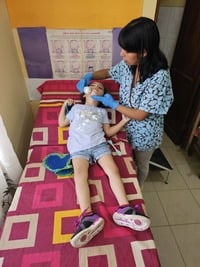Tamara was born very prematurely at 7 months. She has physical and motor disabilities. With the help of specialized care, she is learning to recognize her parents and family members, to identify objects and to react to certain cues.
Complications at birth
When Tamara was born, she spent 25 days in intensive care followed by two months in an incubator, as her respiratory system was not yet fully developed and her digestive system was not functioning.
"When Tami reached the right weight, the doctors examined her. They diagnosed her with leukomalacia, a rare disease. For us, this meant radical changes. Our lives were turned upside down. My husband Cristián continued working, but I had to drop everything to devote myself to Tamara full-time," says Daniela Anahí, the little girl's mother. Daniela Anahí is a lawyer, but she hasn’t practiced since the birth of her daughter.
Words and attention at the heart of her care
In 2020, the little girl and her mother went to a rehabilitation center in Caranavi, to the northeast of La Paz. This center is one of HI’s partners. Among other things, HI has provided the center with materials such as cards and charts for language therapy sessions, as well as face massagers. Here, Tamara and her mom found a team that has really listened to them and is now providing Tamara with speech therapy and rehabilitation services free of charge.
 Laura Giovana, the center's speech therapist, explains that she began with Tamara by focusing on her feeding difficulties. She worked with her parents to gradually diversify the little girl's diet and teach her to chew. This was the first victory. Today, Tamara can now eat solid and semi-solid foods. Indeed, Tamara also has dysphagia, which means she has trouble swallowing food. As she couldn't chew solids before, she could only be given liquids, such as milk.
Laura Giovana, the center's speech therapist, explains that she began with Tamara by focusing on her feeding difficulties. She worked with her parents to gradually diversify the little girl's diet and teach her to chew. This was the first victory. Today, Tamara can now eat solid and semi-solid foods. Indeed, Tamara also has dysphagia, which means she has trouble swallowing food. As she couldn't chew solids before, she could only be given liquids, such as milk.
When she first arrived at the center, Tamara was unable to make eye contact. Laura Giovana worked with her on language and comprehension, teaching her to follow simple instructions and express herself.
"Today, thanks to the therapy, Tamara reacts to her first name. She understands simple instructions such as "look at this" or "pick up that". She is making noises to communicate and is saying her first words, like "Mommy." She understands what we say to her and knows how to indicate the different parts of her body - that's a big step forward,” Laura Giovana tells us happily.
The center uses recycled materials for its activities with children, such as recycled paper for drawing or printing illustrations, teaching panels made from cardboard, straw, thread, etc., plastic bottles filled with pebbles, water, grains of corn, etc. to stimulate hearing and surgical gloves filled with different textures (sand, earth, etc.) to work on sensory perceptions.
Encouraging progress
"Tami loves coming to therapy and enjoys being played with. Thanks to her sessions at the centre, we've seen some big changes. Before, Tami couldn't pronounce words; she couldn't identify objects. Now she can say a few words, she recognises objects and can communicate her emotions," explains Daniela Anahí.
Now that she's eating better, Tamara's health has improved. As a result, her family can include her more in activities outside the home to socialise her and help her develop.
"We now have a lot of hope for our daughter. We intend to devote ourselves to her as much as we can, to help her become as independent a person as possible," concludes Daniela Anahí.
In Bolivia, HI is working to improve the health of children and adolescents and improve their access to rehabilitation. This project, funded by the DGD until 2024, is being implemented in the departments of La Paz and Santa Cruz, in partnership with the Bolivian Ministry of Health and the Universidad Mayor de San Andrés. Its aim is to train professionals, raise community awareness, set up screening campaigns and improve access to health services. Parents of children with disabilities also receive psychosocial support. 284 people are directly benefiting from these operations.



 Laura Giovana, the center's speech therapist, explains that she began with Tamara by focusing on her feeding difficulties. She worked with her parents to gradually diversify the little girl's diet and teach her to chew. This was the first victory. Today, Tamara can now eat solid and semi-solid foods. Indeed, Tamara also has dysphagia, which means she has trouble swallowing food. As she couldn't chew solids before, she could only be given liquids, such as milk.
Laura Giovana, the center's speech therapist, explains that she began with Tamara by focusing on her feeding difficulties. She worked with her parents to gradually diversify the little girl's diet and teach her to chew. This was the first victory. Today, Tamara can now eat solid and semi-solid foods. Indeed, Tamara also has dysphagia, which means she has trouble swallowing food. As she couldn't chew solids before, she could only be given liquids, such as milk.